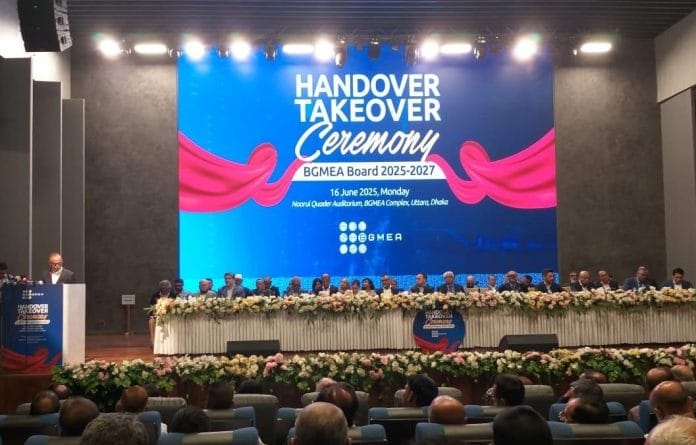The newly elected President of the Bangladesh Garment Manufacturers and Exporters Association (BGMEA), Mahmud Hasan Khan Babu, has identified the ongoing Israel-Iran conflict as a fresh and significant challenge for Bangladesh’s ready-made garment (RMG) sector.
Speaking at the BGMEA Complex in Uttara during the official handover ceremony on Monday afternoon, Babu warned that any surge in global oil prices due to the conflict could have far-reaching consequences for the economy, especially the garment industry.
“The war between Israel and Iran is a new challenge for us. If oil prices rise, it will affect everyone, and our industry will not be spared. To maintain our competitiveness in such uncertain times, we must undertake multiple initiatives,” said Babu.
During the event, outgoing BGMEA administrator Anwar Hossain formally handed over responsibilities to the new president. Prominent former BGMEA presidents including Rubana Huq, Faruque Hassan, S.M. Fazlul Hoque, Kazi Moniruzzaman, Anisur Rahman Sinha, and Rafiqul Islam were present and offered their best wishes to the new leadership.
The handover ceremony was attended by all 35 members of the newly elected BGMEA board. Representatives from the Sammilito Parishad and Forum panels welcomed the new president with floral greetings. The Bangladesh Knitwear Manufacturers and Exporters Association (BKMEA) also extended congratulations to the entire new committee.
In his speech, President Babu acknowledged the range of challenges currently facing the garment sector, including high interest rates, inflation, infrastructure bottlenecks, increased wages, and an ongoing energy crisis. He also cited the U.S. counter-tariffs and India’s recent cancellation of transshipment privileges as further concerns.
“We are taking charge at a time when our beloved industry is facing both local and international hurdles. The challenges are constantly changing, and this war is the latest one. But I believe with collective effort, we can overcome these obstacles,” he added.
Babu outlined several priorities for the new BGMEA board, including advocating for the formation of a dedicated ministry for the garment sector, supporting SME and non-bonded factories and engagement with stakeholders on LDC graduation impacts.
The new board’s other priorities are continued lobbying on U.S. tariff issues, development of a fair exit policy for struggling businesses and reducing BGMEA service charges by 25% from July 1.
He also announced the launch of a digital platform to streamline services, where members can submit applications, complaints, and access important information.
“Before the election, we were Forum or Sammilito Parishad, but now we are one BGMEA family. There is no division anymore. We will work together for the betterment of the industry,” Babu emphasised.
Former presidents echoed strong support for Babu’s leadership. Rubana Huq stated, “We believe Babu bhai will be the best president ever.” Others expressed confidence that the new committee would drive the sector forward, while also urging continued recognition of former members and their families as part of the garment community.
Outgoing administrator Anwar Hossain concluded, “I came here as a government officer. Today, I leave as your companion in this journey forward.” Bangladesh’s RMG industry, the backbone of the nation’s export economy, now stands at a crossroads, as global geopolitics, economic pressures, and domestic reforms converge. The new BGMEA leadership faces a tall order—but hopes remain high for unified and strategic progress.

